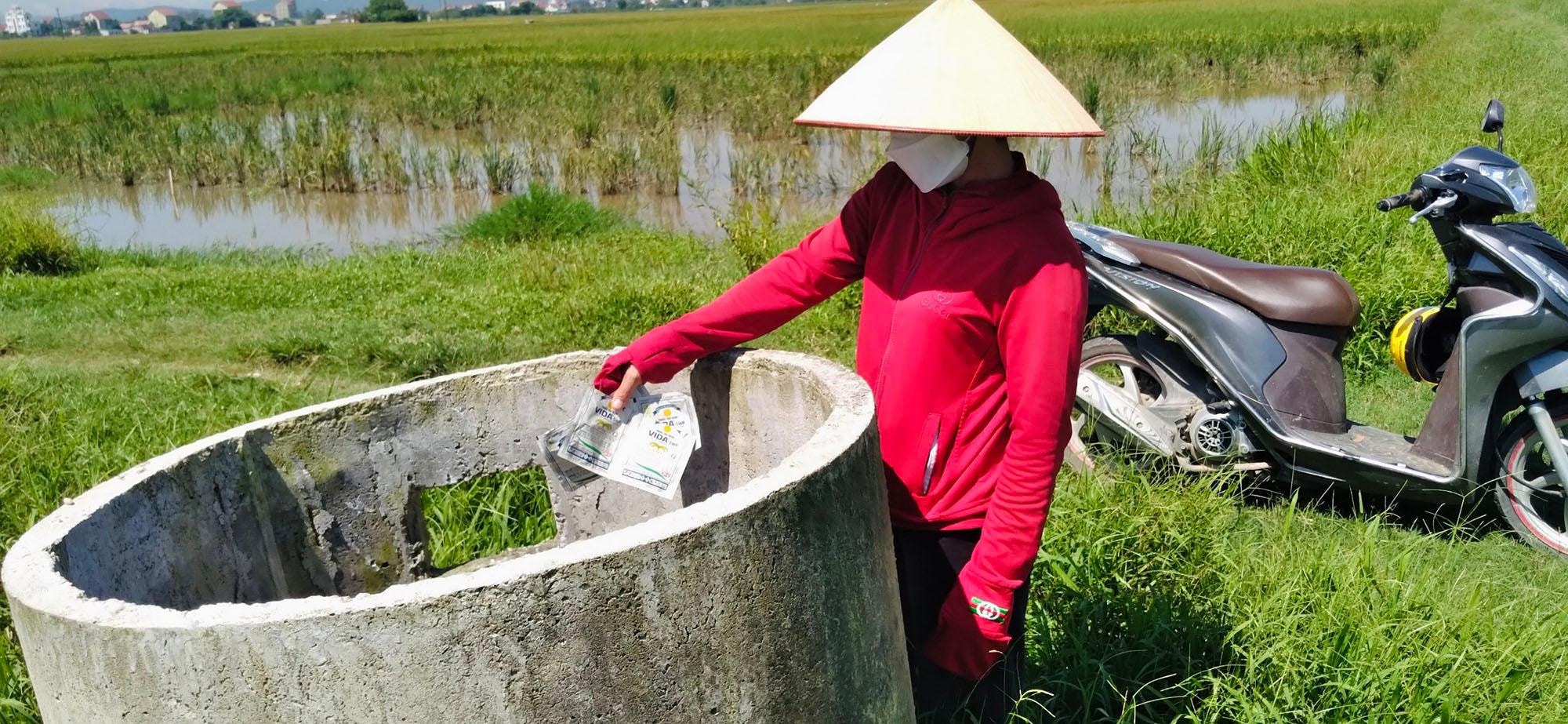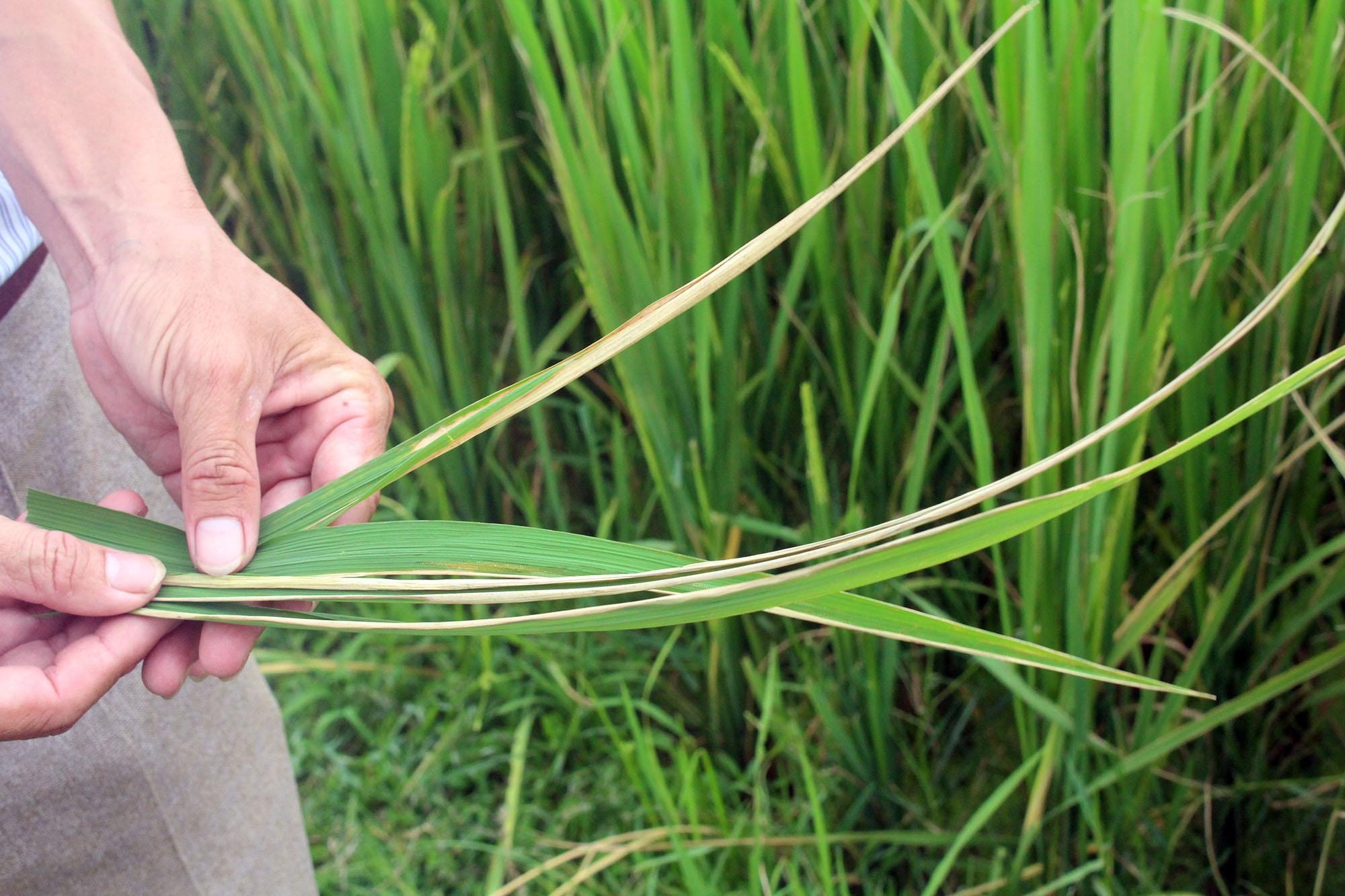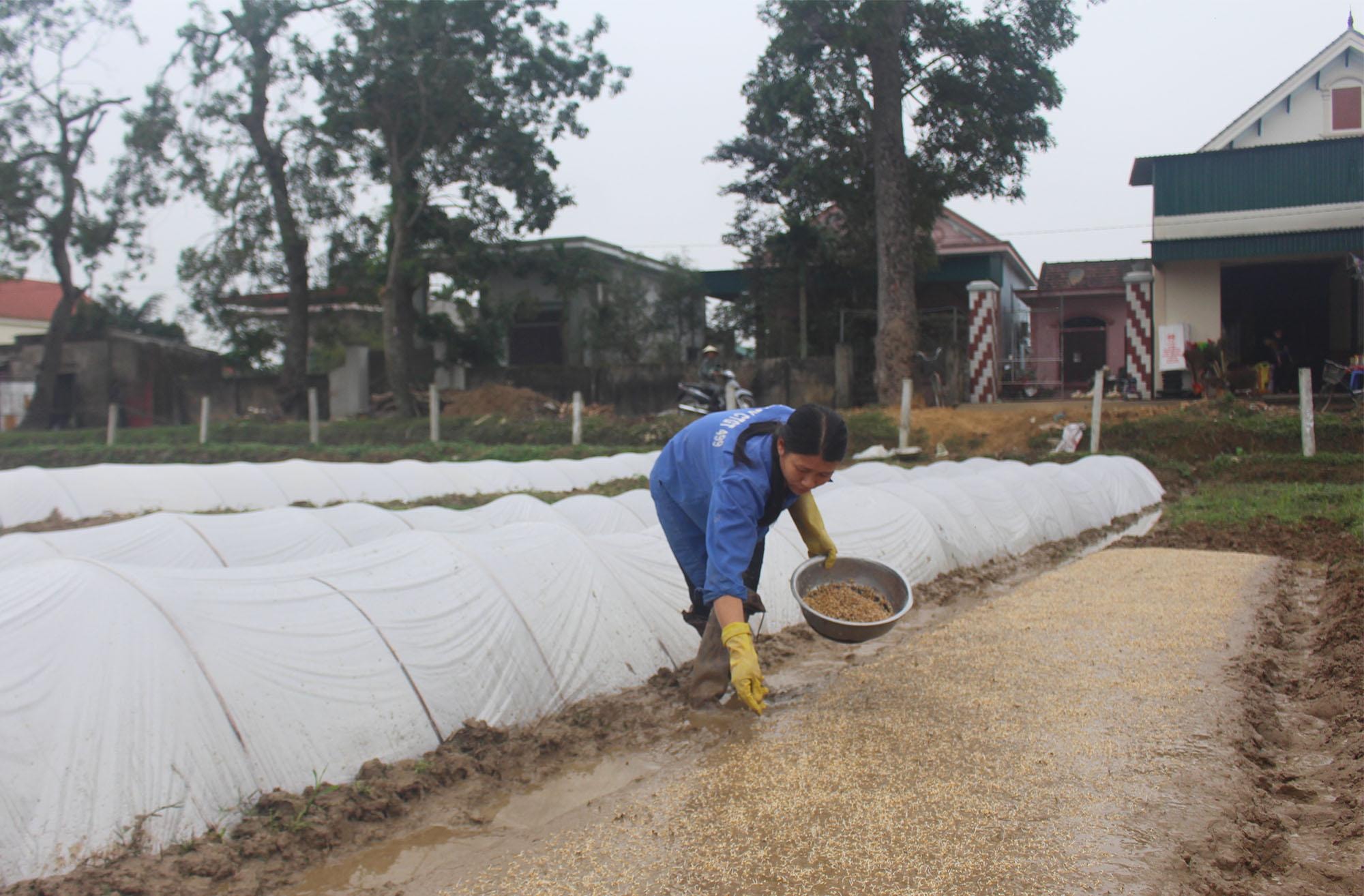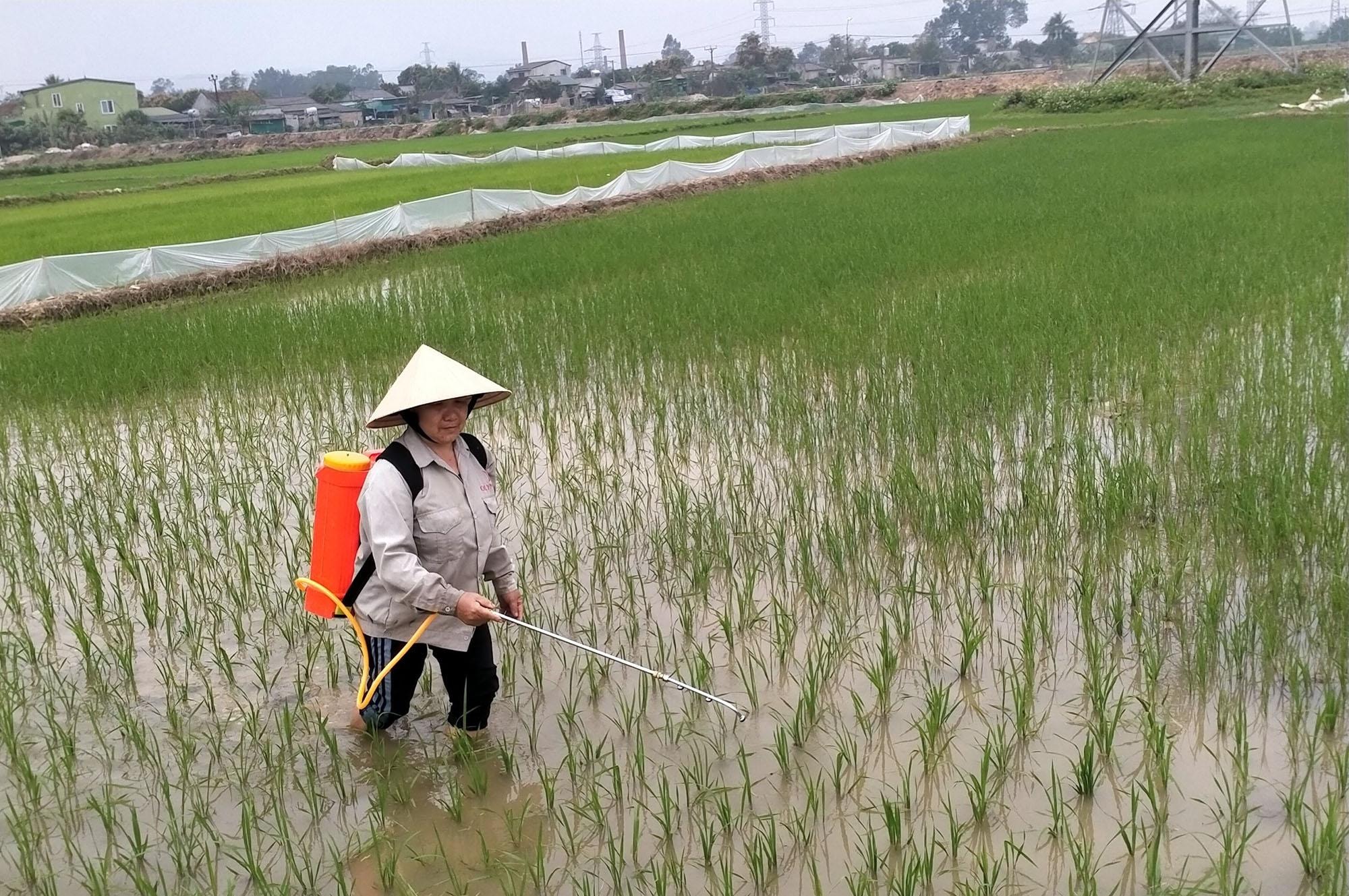Yen Thanh focuses on handling plant protection waste in the fields.
(Baonghean.vn) - As one of the localities supported to invest in building a system of tanks to collect packaging and pesticide bottles after use in the fields, with the support of the province, Yen Thanh district (Nghe An) has made efforts to implement many solutions to promote the effectiveness of this program.
Raising public awareness
Going to the fields to harvest the summer-autumn rice, Ms. Nguyen Thi Hoa, Hamlet 3, Vien Thanh Commune (Yen Thanh) still takes the time to collect some pesticide bags that someone has thrown away near the ditch. "Before there were no tanks, most people threw them right on the bank, few people collected them in bags. But in recent years, there are tanks every few blocks, very few people still throw them away like this. Most of us collect them, both to keep the fields clean and to help reduce water pollution; pesticides and herbicides are very toxic," Ms. Hoa happily said.
 |
Ms. Nguyen Thi Hoa in Vien Thanh commune, Yen Thanh collects pesticide bags into a tank. Photo: Phu Huong |
In 2017, Yen Thanh district was supported to build a system of tanks to store pesticides in the fields, and Bac Thanh commune was also one of the localities that received investment and equipment. The whole commune has 280 hectares of rice, and in the past, several times a year, Bac Thanh directed and mobilized the youth group to collect pesticide waste in the fields. With investment in building enough tanks as required, the waste collection situation has improved significantly.
Mr. Le Van Thuy, Chairman of Bac Thanh Commune People's Committee said: "After having the tank, we continue to promote propaganda, people are also aware of collecting waste instead of littering on the fields. However, the current difficulty is that the tank is placed next to the walkways, harvesters and plows pass by carelessly, causing collisions, the number of broken tanks is quite large but the commune cannot balance the budget to rebuild. Therefore, the commune must now advise people to dispose of pesticide packaging in plastic bags, concentrating on a few points in each commune to occasionally mobilize the youth union to collect."
Khanh Thanh commune has more than 313 hectares of rice, and in the plan, this year Khanh Thanh is also one of the localities receiving investment in construction.plant protection waste tank. The family has 5 sao of rice fields, each rice crop, Mr. Nguyen Van Bac, hamlet 5, Khanh Thanh commune has to spray at least 3 times of pesticides. "There are all kinds of pests that need to be sprayed, from golden apple snails, thrips, herbicides, not to mention the rice plants are often affected by diseases such as brown spot and brown spot. In crops with many pests and diseases, I spray 4-5 times of pesticides", Mr. Bac said.
 |
Pests and diseases frequently appear on rice plants, requiring prevention. Photo: Phu Huong |
Being a rice-growing area, people here are very concerned about pest control, along with the amount of pesticides and waste after use. Therefore, up to now, during each "peak" period of pesticide use, the commune has promoted propaganda, mobilizing people to put the packaging in plastic bags after spraying, and take them to the garbage pits in the fields; in addition, every few years, the youth union will mobilize members to collect waste in the fields. Currently, the survey work has been completed, in the coming time, when the tank system is installed, Khanh Thanh commune will continue to propagate people to collect garbage in the tank.
With an annual planting area of over 300 thousand hectares of various crops, Nghe An "consumes" 300-400 tons of pesticides each year, and discharges 25-30 tons of pesticide packaging and bottles of various pesticides into the fields; meanwhile, the amount of pesticides remaining in the packaging accounts for about 10% of the total amount of pesticides consumed.
In Yen Thanh district alone, with an area of over 44,000 hectares of agricultural land, including over 13,200 hectares of rice land, the total rice area accounts for over 10% of the province, the amount of pesticides used in the fields is very large; pests on rice plants frequently arise, forcing farmers to take precautions to protect production.
Attaching responsibility to commune and hamlet authorities
According to Mr. Nguyen Van Duong - Vice Chairman of Yen Thanh District People's Committee, if the regulations are met, the total number of tanks needed to be placed in the district's rice growing areas will be up to 4,400 tanks. As of March this year, 1,504 tanks have been installed, so the area is still short of 2,896 tanks. Due to the lack of tanks, producers have indiscriminately discarded pesticide packaging and bottles in the fields after using pesticides.
The need for investment in projects in the district is very large, the district has not been able to balance the capital source to invest in building tanks, collecting waste to protect plants after use. Although it is known that it is very important, priority must still be given to key traffic and irrigation projects serving people's lives. Therefore, the construction of these projects mainly depends on socialization and support from the provincial budget.
 |
Farmers in Long Thanh commune plant rice seedlings. Photo: Phu Huong |
Along with Do Luong, Anh Son, Thanh Chuong, Dien Chau districts, in 2017, Yen Thanh district invested in building 1,103 tanks to store plant protection waste after use in 10 communes. In response to the actual production needs, this year, Nghe An Department of Cultivation and Plant Protection will continue to build 1,112 tanks in 12 communes of the district including Son Thanh, Bao Thanh, Khanh Thanh, Lien Thanh, Ly Thanh, Dong Thanh, Hung Thanh, Kim Thanh, Quang Thanh, Tho Thanh, Phu Thanh and Tang Thanh.
In the district's plan, to effectively promote this tank system, it will focus on promoting propaganda and raising people's awareness in collecting packaging and waste, limiting the spread of plant protection chemicals in fields and the environment, protecting the landscape, and aiming to build agricultural and rural tourism.
At the same time, strengthen inspection, supervision, and assign responsibility to commune and hamlet authorities in handling cases where people deliberately do not comply with the provisions of the Environmental Law. The district will also direct relevant departments and branches to coordinate with communes to transport and treat plant protection waste in accordance with regulations.
 |
Farmers spray pesticides on summer-autumn rice plants. Photo: Phu Huong |
In addition to investing in building tanks to reduce the impact of pesticide residues on the rural environment, directly affecting cultivated land, water resources and agricultural products, propaganda using many solutions to raise awareness and consciousness about this issue is also an issue that needs attention. Thereby, helping people realize the terrible effects of pesticide residues on humans and the community, gradually changing the habit of indiscriminately throwing away pesticide packaging and bottles in the fields.
Mr. Nguyen Tien Duc - Head of the Provincial Department of Crop Production and Plant Protection said: "Along with propaganda on mass media such as newspapers, radio and television, we plan to coordinate with the People's Committees of communes in Yen Thanh district to organize 24 conferences to propagate to people about the harmful effects of pesticides.pesticide residueswith 1,200 participants; broadcast on the commune's loudspeaker system content about the impact of pesticides on the environment and public health; guide the collection of pesticide packaging and bottles after use in the fields.


